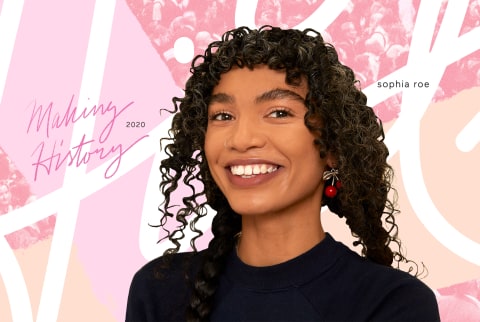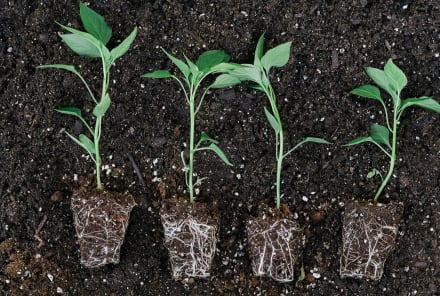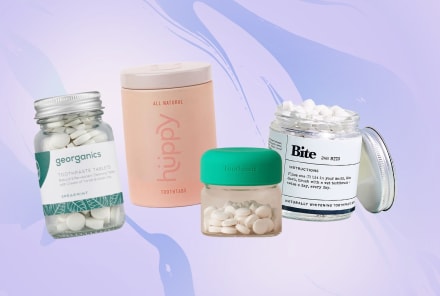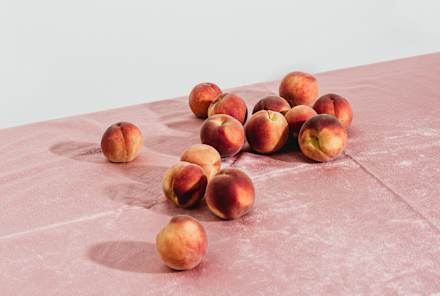Advertisement
Sophia Roe Spills The "Discomfort Tea" On Diversity & Trauma

Hannah Margaret Allen is the Executive Editor at mindbodygreen. Previously she worked at Inverse, Men's Journal, and Condé Nast.

In our series Making History, we're talking to people who are leading the charge to bring much-needed diversity to wellness. They're sharing with us the work that they do, highlighting the voices that need to be heard and telling us what we aren't talking about—but should be. This week, we're talking to chef and well-being advocate Sophia Roe.
Though she started as a chef, Sophia Roe is first and foremost a storyteller, whether the medium is food or words on her Instagram. Her message is one of accessible and honest well-being.
It started when Roe was 24, and she found out she had a cluster tumor on one of her ovaries. After surgery and undergoing radiation, she shifted her passion for food to healthy food and overall well-being.
Growing up with an addict mother and then being in the foster care system, she overcame her trauma through talking about it and having a supportive community. Now as a well-being advocate, Roe is vocal about making sure diverse voices and stories have a place to be heard. When it could be disheartening ("I have been the only woman of color on more panels than not"), she channels her unbridled optimism into change and potential growth.
How do you think we can make well-being more diverse?
It's a big, important question. Do I think that women of color have completely different subsets of knowledge? Absolutely. And I don't just mean like women of color as in black women—I mean Asian women, Muslim women. Everyone. How can we start to implement change? We can talk to them. I think what women of color bring to the table is a different narrative told from a different perspective. I think that's very sexy and special. In terms of my own delivery, you know I use my voice a lot. If there's one thing I understand, it's words.
What is wellness to you?
I feel like wellness really is storytelling, positioning, and understanding... Forgiveness and grace, most importantly. And that means grace with yourself, and that also means grace with people that piss you off. You know I tell people all the time, "true wellness" is loving people that you hate. And I feel like some of the best stories in the world, to give examples of those traumas, triumphs, sufferings, are going to come from the women-of-color demographic. Truly, you know, I think people need to get a little bit more comfortable with pain and repurposing pain. I had a horrible upbringing, and I'm the happiest person you've ever met.
The idea of repurposing your pain is a huge part of your story. How'd you get comfortable talking about your story openly?
This is so hard. I have a very engaged community of people on Instagram. They are ready to call you out or are ready to support you at any point. So for me, it was really just realizing that I can connect with these people. So I was like, I'm going to take the past five years of healing, journal entries, therapy, and put that shit on the Internet.
Everything I post was leading with humans first. Under the guise of forgiveness and grace and effective important impactful communication. I always want to be direct because direct is effective. So that can get you in hot water sometimes because some people love drinking comfort tea, but I like serving discomfort tea because discomfort is how you grow.
How do you encourage the well-being community to drink more "discomfort tea"?
The whole idea is pay attention to people who look different from you and who have different stories than you. It's really simple. If there's somebody out there who looks different from you, they probably have a really great story for you.
But I think wellness is really the circumference of everything that makes you human. And that can't just mean food or just exercise or just self-care. It's got to be everything.
What has your experience been like with diversity in the food world?
I feel like black chefs and female chefs are finally getting visibility with things like Cherry Bombe magazine and Radiant [Health magazine]. You're starting to see women highlighted in that space. But there definitely needs to be more visibility.
An actionable thing that people can do to honor diversity in food is to really talk about how diversity inspired a diet choice more. Like "I am so inspired by Thai cooking lately, and these are some foods that I'm making." You can do the exact same thing with African food, Spanish food, you name it. Storytelling is a really big part of how I make food.
What sparked your interest in being more healthy?
I got a tumor on my ovaries removed when I was 24. So I came out of a surgery and that was it for me. I was like, "All right, Soph, you got to get yourself healthy right now." I did this crazy-ass silent retreat that changed it all, and it taught me to journal and how to have a really great honest relationship with words. Rather than "you are what you eat," think "you are what you communicate to yourself." If you communicate "well" to yourself and you communicate "life" to yourself, you're gonna want to eat better. I was so set free by how I communicated with myself.
We understand you're working on a book. What's it going to be about?
My book is all small stories. I feel like my delivery is so much a part of it. You know, a big book on trauma is very intimidating. But short vignettes and moments is a really great way to handle trauma in small doses. I've got to get over my traumas to get past my traumas. Understanding what it is, finding out what the triggers are, and managing those triggers. So that is really what the book is about, and I believe if you want to talk wellness, that's the one place to start, before anything else. Starting from the inside out. All the green smoothies and kale in the world ain’t gonna make you happy if you're walking around with all that shit inside.
Other than your book, what else are you thinking about?
My biggest focus outside of my book right now is wellness and addiction. I don't see it anywhere. Obviously it's really personal to me because my mom is still a drug addict. My mom's been a drug addict for 30 plus years, and I spent so much time in halfway houses as a kid. They're not safe. I can't think of a group of a demographic that needs wellness more. I never see it talked about. So that's a big focus for me right now is really talking about it.
It's really just like...if you see an opportunity, give it to somebody who doesn't usually get it. It's all about the underdog.
This interview has been edited and condensed for clarity.











